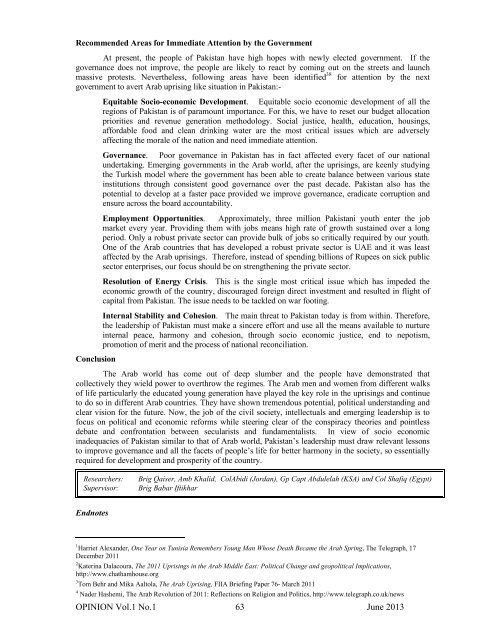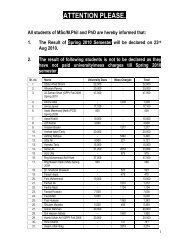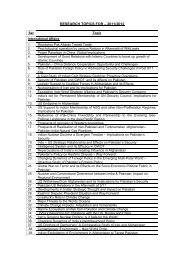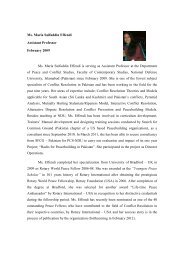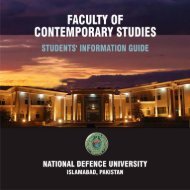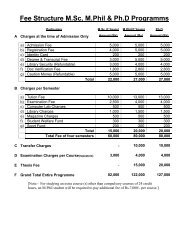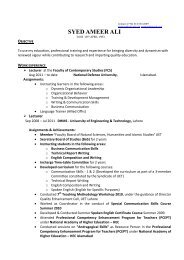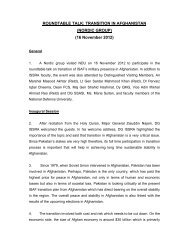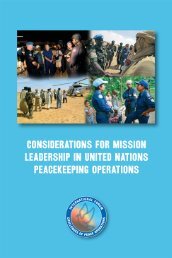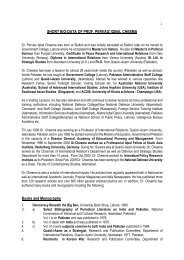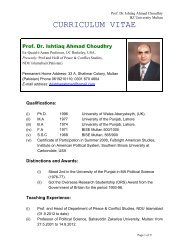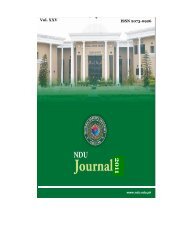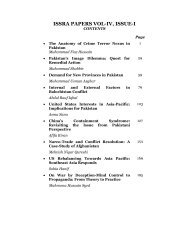OPINION Vol.1, No.1 June 2013 - National Defence University
OPINION Vol.1, No.1 June 2013 - National Defence University
OPINION Vol.1, No.1 June 2013 - National Defence University
You also want an ePaper? Increase the reach of your titles
YUMPU automatically turns print PDFs into web optimized ePapers that Google loves.
Recommended Areas for Immediate Attention by the Government<br />
At present, the people of Pakistan have high hopes with newly elected government. If the<br />
governance does not improve, the people are likely to react by coming out on the streets and launch<br />
massive protests. Nevertheless, following areas have been identified 38 for attention by the next<br />
government to avert Arab uprising like situation in Pakistan:-<br />
Conclusion<br />
Equitable Socio-economic Development. Equitable socio economic development of all the<br />
regions of Pakistan is of paramount importance. For this, we have to reset our budget allocation<br />
priorities and revenue generation methodology. Social justice, health, education, housings,<br />
affordable food and clean drinking water are the most critical issues which are adversely<br />
affecting the morale of the nation and need immediate attention.<br />
Governance. Poor governance in Pakistan has in fact affected every facet of our national<br />
undertaking. Emerging governments in the Arab world, after the uprisings, are keenly studying<br />
the Turkish model where the government has been able to create balance between various state<br />
institutions through consistent good governance over the past decade. Pakistan also has the<br />
potential to develop at a faster pace provided we improve governance, eradicate corruption and<br />
ensure across the board accountability.<br />
Employment Opportunities. Approximately, three million Pakistani youth enter the job<br />
market every year. Providing them with jobs means high rate of growth sustained over a long<br />
period. Only a robust private sector can provide bulk of jobs so critically required by our youth.<br />
One of the Arab countries that has developed a robust private sector is UAE and it was least<br />
affected by the Arab uprisings. Therefore, instead of spending billions of Rupees on sick public<br />
sector enterprises, our focus should be on strengthening the private sector.<br />
Resolution of Energy Crisis. This is the single most critical issue which has impeded the<br />
economic growth of the country, discouraged foreign direct investment and resulted in flight of<br />
capital from Pakistan. The issue needs to be tackled on war footing.<br />
Internal Stability and Cohesion. The main threat to Pakistan today is from within. Therefore,<br />
the leadership of Pakistan must make a sincere effort and use all the means available to nurture<br />
internal peace, harmony and cohesion, through socio economic justice, end to nepotism,<br />
promotion of merit and the process of national reconciliation.<br />
The Arab world has come out of deep slumber and the people have demonstrated that<br />
collectively they wield power to overthrow the regimes. The Arab men and women from different walks<br />
of life particularly the educated young generation have played the key role in the uprisings and continue<br />
to do so in different Arab countries. They have shown tremendous potential, political understanding and<br />
clear vision for the future. Now, the job of the civil society, intellectuals and emerging leadership is to<br />
focus on political and economic reforms while steering clear of the conspiracy theories and pointless<br />
debate and confrontation between secularists and fundamentalists. In view of socio economic<br />
inadequacies of Pakistan similar to that of Arab world, Pakistan’s leadership must draw relevant lessons<br />
to improve governance and all the facets of people’s life for better harmony in the society, so essentially<br />
required for development and prosperity of the country.<br />
Researchers:<br />
Supervisor:<br />
Brig Qaiser, Amb Khalid, ColAbidi (Jordan), Gp Capt Abdulelah (KSA) and Col Shafiq (Egypt)<br />
Brig Babar Iftikhar<br />
Endnotes<br />
1 Harriet Alexander, One Year on Tunisia Remembers Young Man Whose Death Became the Arab Spring, The Telegraph, 17<br />
December 2011<br />
2 Katerina Dalacoura, The 2011 Uprisings in the Arab Middle East: Political Change and geopolitical Implications,<br />
http://www.chathamhouse.org<br />
3 Tom Behr and Mika Aaltola, The Arab Uprising, FIIA Briefing Paper 76- March 2011<br />
4 Nader Hashemi, The Arab Revolution of 2011: Reflections on Religion and Politics, http://www.telegraph.co.uk/news<br />
<strong>OPINION</strong> <strong>Vol.1</strong> <strong>No.1</strong> 63 <strong>June</strong> <strong>2013</strong>


